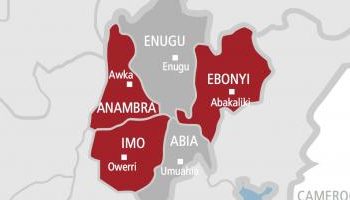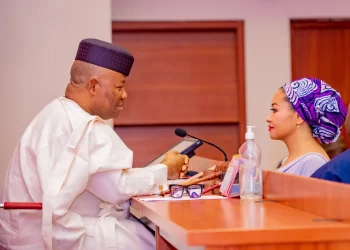On a rancorous and abrupt note, the National Conference ended its final plenary session two weeks ago, thus shattering the optimism of many Nigerians that the august assembly could steer the country to the path of fiscal federalism. Rather, it has added another ugly chapter to Nigeria’s wearily painful history. A whirlwind of ethnic and selfish interests rolled this agenda downhill. Before reaching this point of no return, the 50 wise men of the conference had tried in vain to wade through the miasma of disagreements in trouble-shooting sessions. The conference will resume on August 4, just to submit its report to the Federal Government.
This fiasco further advertises the sharp divisions in our polity, irrationally being patched up since independence, and the obvious reluctance of the country’s power elite to appreciate why development has been eluding us. The South had canvassed a return to the First Republic paradigm when regions controlled 50 per cent of their resources; 30 per cent was shared among all the regions, while 20 per cent went to the Federal Government.
Concessions by the South narrowed the derivation demand to 18 per cent, but the North put forward a quid pro quo of five per cent revenue allocation for the “reconstruction” of the North-East region battered by Boko Haram insurgency. The Northern delegates’ rejection of the inclusion of areas outside their region with similar challenges from benefiting from the fund and its indefinite nature were motives other delegates could not understand. Therefore, the proposal was not sustained.
Equally centrifugal was a request to set aside five per cent for solid minerals development against the backdrop of an existing special fund for this purpose, being diverted by federal authorities. A total of N783 billion belonging to the fund has been abused, according to a Senate investigation. This ought to have been the concern of the delegates misguided on the issue. So helpless was the conference under Idris Kutigi’s chairmanship in achieving a consensus on derivation that it curiously resolved to return the issue to the Federal Government, which will set up a technical committee to midwife an acceptable formula.
Derivation is an article of faith in federal arrangements all over the world. The founding fathers of the Nigerian state saw it as such, and kept faith with it. Without question, it paid off, evident in the healthy development rivalries among the Eastern, Western, Northern and Mid-Western regions. This meant that not much funds were at the centre for stealing by corrupt public officials.
But the Nigeria of today is a pseudo federation of 36 states, the Federal Capital Territory, Abuja and 774 Local Government Areas, all acting as leeches on oil revenues to survive. With a disproportionate sharing template in favour of the Federal Government, which collects 52.68 per cent, states are left with just 26.2 per cent, while 20.6 per cent goes to the local councils monthly.
This easy cash has made the states lazy and bereft of development strategies that could boost their revenue base. Much of Nigeria’s vast arable land is lying fallow, just as her 34 solid mineral types remain undeveloped. Ironically, these resources sustained the economies of the regions before 1966.
As economic realities indicate, no state is viable with their indulgence in rent-seeking, save for Lagos, which is potentially so, with its N20 billion monthly average internally generated revenue. According to National Bureau of Statistics data, the state generated N219.2 billion in 2012, which was, however, not even enough to underwrite its obligations. Rivers State was a distant second with N66 billion within the same period. At the bottom of the pecking order are Yobe (N1.7 billion); Zamfara (N2.5 billion); Borno (2.4 billion); and Kogi (3.1 billion) states.
Consequently, states are plagued by the failure to pay workers’ salaries and allowances and have heavy debt portfolios. Primary school teachers in Benue State ended their nine months of strike three weeks ago, over the non-payment of the N18,000 minimum wage. Other states are not insulated either.
The Fiscal Responsibility Commission said that as of December 31, 2011, Lagos, Ekiti, Kaduna, Cross River, Ondo, Edo, Bayelsa, Kwara and Ebonyi states had debt overhang. According to the Debt Management Office, these states exceeded the limit it had prescribed, just as it warned that debt stocks should not be above 50 per cent of the statutory annual revenues. Ekiti State went on a binge with its N44.97 billion revenue, incurring N35.98 billion debt; Kaduna had N63.94 billion revenue, compared to its N40.08 billion debt. This negative trend ran through the states affected within the period in question.
Objective local and international conditions convincingly suggest that the country’s future is endangered with the delegates’ rejection of a rational derivation formula. Oil is a finite resource; and emergence of new markets means a drop in revenue. The parasitic elite in our system have to get the message. If a state like Rivers, the second highest oil revenue beneficiary, is agitated after its monthly revenue plummeted from N17 billion to N13 billion, prompting the setting up of a committee on how to deal with it, then there is trouble in the horizon for states less privileged.
However, the response of Bayelsa State, which ended its business investment forum last week with an international audience in attendance, in what its governor, Seriake Dickson, said was aimed at preparing the state for a future without oil, is a rational step that other states should emulate with their abundant mineral deposits.
South Africa, with its $2.5 trillion worth of mineral reserves, occupies the number one spot in global ranking, while Guinea’s $222 billion reserve places it fifth, according to The Telegraph of London. These are clear evidence that solid minerals can enrich as much as oil does. More importantly, harnessing them would boost employment, which the economy sorely needs.
Therefore, northern elements − certainly out of sync with reality − that aborted the just and fair derivation principle are undermining the economic growth of states in that part of Nigeria, most of which have been marooned at the lower rungs of national development index.














































